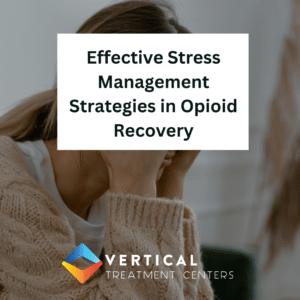
Effective Stress Management Strategies in Opioid Recovery
The journey to recovery from opioid addiction can be an uphill battle, with stress being a common hero’s adversary. In this post, we aim to offer practical strategies to help manage stress, serving as critical support in the recovery process.
The Connection Between Stress and Opioid Addiction
Numerous studies have established stress as a key contributor to opioid use and addiction. Prolonged exposure to stress can lead to opioid misuse as a form of self-medication. Furthermore, during the recovery phase, stress can act as a trigger for relapse, making it a pivotal focus point in recovery strategy.
The Impact of Stress on the Recovery Process
Stress can have adverse effects on both mental and physical health, potentially impeding recovery progress. Increased stress levels can exacerbate withdrawal symptoms and create feelings of anxiety and depression. Understanding and finding ways to manage stress can significantly aid the recovery journey.
Understanding Your Stressors
Identifying personal stress sources—whether they are personal, social, or environmental—is central to effective stress management. Recognizing these stressors can provide the groundwork for developing personalized coping strategies.
Stress Management Strategies in Opioid Recovery
Mindfulness and Meditation
Practicing mindfulness and meditation can reduce stress by reclaiming your focus from stressful thoughts and redirecting it to the present moment. Incorporating these practices into your daily routine, even for just a few minutes each day, may provide substantial benefits.
Physical Activity and Exercise
Engaging in physical activity is a proven stress-reliever. Activities like walking, yoga, or even high-intensity workouts can help release built-up tension and mitigate stress levels. More importantly, it’s crucial to choose an activity that you enjoy to ensure consistency.
Balanced Diet and Adequate Sleep
Eating a balanced diet and ensuring adequate sleep are often overlooked but essential components of stress management. Both contribute to your overall physical health and resilience, helping the body handle stress more effectively.
Therapy and Support Groups
Individual or group therapy can help you understand and manage stress as part of the recovery process. Support groups can provide a platform to share experiences and coping strategies, offering emotional support and shared understanding.
Implementing Stress Management Strategies into Your Recovery Plan
Implementing these stress management techniques into your recovery plan can seem daunting, but remember, the goal is progress, not perfection. Involve healthcare professionals and your recovery support network to help you determine what strategies work best for you.
Dealing with Setbacks
The path to recovery is not linear, and setbacks are part of the journey. Stress management is a critical skill in responding to these setbacks without resorting to relapse. Building resilience and adapting to new stressors will grow easier over time.
Conclusion
Stress management is a crucial aspect of opioid recovery. Implementing these suggested strategies and enlisting the support of healthcare professionals can contribute significantly towards a successful recovery. Remember, no matter how brutal the battle, every step taken is a victory in itself.